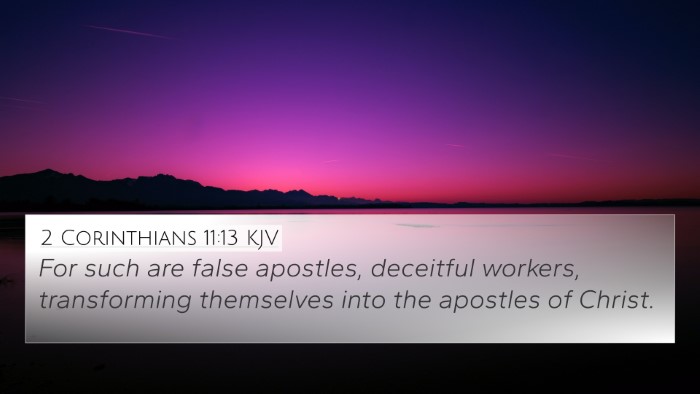Understanding 2 Thessalonians 2:10
2 Thessalonians 2:10 states: "And with all deceivableness of unrighteousness in them that perish; because they received not the love of the truth, that they might be saved." This verse addresses the spiritual consequences faced by those who reject the truth and offers significant insights into the themes of deception, the necessity of truth, and salvation.
Summary of Biblical Meaning
This verse outlines a stark contrast between those who are deceived and perish and those who embrace the truth, ultimately leading to salvation. The use of the term "deceivableness" indicates the alluring nature of falsehoods that can lead individuals away from the path of righteousness.
-
Deception and Its Consequences: The verse warns that unchecked deceit has dire consequences for one’s spiritual state, as highlighted by the commentaries of
Matthew Henry and Adam Clarke.
-
The Importance of Truth: The phrase "love of the truth" emphasizes that a genuine affection for the truth is vital for salvation, a point noted in
Albert Barnes’s commentary.
-
Salvation Through Acceptance: The emphasis on salvation in this verse directs the reader's focus toward the necessity of receiving and embracing the truth presented in the Gospel.
Commentary Insights
The commentaries provide various insights that deepen our understanding of this verse:
-
Matthew Henry: He elaborates that this deception operates actively and passively—those who perish do so not just due to the deceit but because they fail to grasp and cherish the truth.
-
Albert Barnes: Barnes emphasizes that the unrighteousness leads souls to a state of condemnation because they preferred lies over the divine truth.
-
Adam Clarke: Clarke reflects on the necessity of divine enlightenment, suggesting that without divine assistance, individuals are bound to be led astray by deceit.
Cross-Reference Connections
The significance of 2 Thessalonians 2:10 can be further illuminated through cross-references in Scripture. Here are 10 related Bible verses that connect with the themes of this passage:
- John 8:32: "And ye shall know the truth, and the truth shall make you free." This verse emphasizes the liberating power of truth.
- Romans 1:18: "For the wrath of God is revealed from heaven against all ungodliness and unrighteousness of men, who hold the truth in unrighteousness." This highlights the consequences of suppressing the truth.
- 2 Timothy 4:3-4: "For the time will come when they will not endure sound doctrine; but after their own lusts shall they heap to themselves teachers, having itching ears." This indicates the tendency to divert from the truth.
- 1 John 4:6: "We are of God: he that knoweth God heareth us; he that is not of God heareth not us." This presents the distinction between those who accept truth and those who do not.
- Revelation 21:8: "But the fearful, and unbelieving, and the abominable, and murderers, and whoremongers, and sorcerers, and idolaters, and all liars, shall have their part in the lake which burneth with fire and brimstone." This highlights the fate of the deceived.
- Ephesians 6:11: "Put on the whole armor of God, that ye may be able to stand against the wiles of the devil." This acknowledges the spiritual warfare involved in recognizing deception.
- Galatians 5:7: "Ye did run well; who did hinder you that ye should not obey the truth?" This stresses the importance of obedience to truth.
- Philippians 1:10: "That ye may approve things that are excellent; that ye may be sincere and without offence till the day of Christ." This promotes the pursuit of excellence in truth.
- Colossians 2:8: "Beware lest any man spoil you through philosophy and vain deceit, after the tradition of men, after the rudiments of the world, and not after Christ." This warns against falling for human deception.
- 1 Corinthians 13:6: "Rejoiceth not in iniquity, but rejoiceth in the truth." This underscores the Christian's relationship with the truth.
Thematic Connections in Scripture
Through this passage and its cross-references, one can observe significant thematic Bible verse connections that highlight the importance of truth in a believer’s life, the nature of deception, and the eternal implications of the choices made concerning faith. These connections encourage a deeper study and a comparative Bible verse analysis.
Tools for Cross-Referencing
To engage more deeply with 2 Thessalonians 2:10 and its related scriptures, various tools for Bible cross-referencing can be helpful:
- Bible Concordance: A comprehensive tool that lists words alphabetically and their occurrences in the Bible.
- Bible Cross-Reference Guide: Guides that offer connections between various passages in the Scriptures.
- Bible Cross-Reference System: A structured method to track and study related verses.
Conclusion
In conclusion, 2 Thessalonians 2:10 serves as a crucial reminder of the consequences of rejecting the truth. By exploring its meaning through public domain commentaries and cross-referencing with related scripture, one gains a deeper understanding of its implications for faith and salvation, supporting the significance of inter-Biblical dialogue and thematic connections across the entirety of Scripture.


























